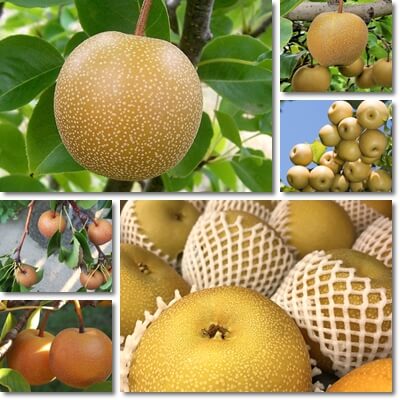Considering their unexceptional nutritional status, Asian or Korean pears are a source of minor health benefits at most. Most of the benefits of Asian or Korean pears are derived from a low glycemic index score of only 26, good dietary fiber content and the fact they are low-carbohydrate and sodium-free. Modest amounts of vitamins C and K, almost negligible amounts of B vitamins, choline, vitamin E, magnesium, potassium, phosphorus, manganese and trace amounts of calcium, copper, selenium and zinc contribute towards one’s nutrition and hold benefits primarily for for blood pressure, blood cholesterol and constipation relief.
Are Asian pears entirely edible?
Yes and it’s actually good for you and for your health to eat the pears with skin. Asian pears skin is perfectly edible and provides good amounts of dietary fiber, indigestible plant material that favors digestive and cardiovascular health as well as holds benefits for blood sugar control. But while eating Asian pears with skin is good for you, it’s important the fruit be from organic agriculture. Fruit sources from conventional agriculture may retain trace amounts of pesticides in the skin which is not particularly healthy long-term. Now let’s see what are Asian pears good for.

What are the benefits of Asian pear?
Asian pears are good for diabetics because they have a low glycemic index score. The glycemic index (GI) measures how fast the carbohydrates in a food raise blood sugar levels. Below 55 is a low GI. Between 56-69 is a moderate GI. Between 70-100 is a high GI. Asian pears glycemic index is 26 (determined for type 2 diabetics), one of the lowest values for fruit. This means they don’t raise blood sugar levels too much too fast, but rather produce a slow, steady and manageable rise that favors blood sugar control.
In fact, Asian pears are one of the 10 lowest glycemic fruits you can eat with diabetes.
Source of fiber for blood sugar control
100 g of Asian pear provides approximately 3.6 g of dietary fiber. One fruit at 122 g has 4.4 g, while 1 larger fruit at 275 g has 9.9 g. Dietary fiber is plant material that doesn’t actually get digested. But as it passes through the gastrointestinal tract, it delays digestion which results in a slower rate of sugar absorption into the bloodstream, favoring blood sugar control. Of course, a lot of the fiber is located in the skin of the fruit which is edible so, to get the most of these benefits, you’d have to eat your Asian pears with skin.
Help relieve constipation naturally
Asian pears are a good source of dietary fiber which relieves constipation naturally. Essentially, by absorbing water and adding bulk to stools, dietary fiber stimulates peristalsis, the natural movements of the intestinal muscles that push food/waste down the digestive tract. So for easy and natural constipation relief, try having some fruits with skin, whether it’s Asian or Korean pears, regular pears or others. In my experience, if you’re constipated, it helps to have plain water (lots of it) and a fruit with skin in the morning then just wait. The laxative effects of fruit should be visible within several hours.
Also see my 7 easy tricks to treat constipation.

Minor benefits for high cholesterol and blood coagulation
Considering their nutritional information, notably good fiber content (3.6 g per 100 g) and modest vitamin K content (4.5 mcg per 100 g), Asian pears may hold minor benefits for cholesterol and blood coagulation. On the one hand, dietary fiber binds to fat and lowers its rate of absorption into the bloodstream, indirectly contributing to lower cholesterol levels. On the other hand, vitamins K promotes blood coagulation which helps with lesser bruising, nosebleeds and essentially prevents blood loss through wounds.
Source of vitamin C
Asian pears are a modest source of vitamin C. How much vitamin C in Asian pear? There are 3.8 mg of vitamin C in 100 g of Asian pear, 4.6 mg in a small fruit at 122 g and 10.4 mg in a larger fruit at 275 g. And whilst research shows visible health benefits of vitamin C starting from intakes of over 500 mg daily, getting as much of the vitamin as you can on a daily basis is pivotal for good health.
Vitamin C has strong antioxidant and anti-inflammatory properties with benefits for the cardiovascular system (including cholesterol-lowering properties), antibacterial effects, immune-boosting action, supports collagen production for younger-looking skin and reduces wound healing time.
Benefits for high blood pressure
If you have high blood pressure, lowering your sodium intake and upping your magnesium and especially potassium intake is all the treatment you need to reverse your high blood pressure naturally.
Asian pears are essentially sodium-free: 0.1 micrograms of sodium per 100 grams of fruit (consider that an average adult can get up to 2300 mg of sodium a day).
They also provide 8 mg of magnesium per 100 g, 10 mg per one small fruit at 122 g and 22 mg per one large fruit at 275 mg (less than 5% of the recommended daily intake, RDI for an average adult). And 121 mg of potassium per 100 g, 148 mg per small fruit and 333 mg per large fruit (less than 5% of the RDI for an average adult). All of these nutritional characteristics combined make Asian pears a relatively good fruit to consider for lowering high blood pressure.
Find out more about the properties of Asian pears.
What are other health benefits of Asian pear?
Some of the other benefits of Asian pears are derived from the properties and health effects of the nutrients they contain. By ranking so low on the glycemic index scale, Asian pears can be considered for the prevention of type 2 diabetes. Small amounts of vitamins B1, B2, B3, B5, B6, B9 and choline support digestion and energy metabolism. Along with a modest carbohydrate content, eating Asian pears elevates energy levels.
The modest amounts of vitamin C maximize iron absorption which restores vitality. Vitamin K prevents calcium from accumulating in joints, heart valves or blood vessels, preventing atherosclerosis that could lead to cardiovascular disease. Copper further favors strong bones and teeth and is an antioxidant and anti-aging agent. Magnesium holds benefits for blood sugar control. Potassium reverses dehydration and combats water retention from excess sodium and associated side effects (face puffiness, swollen legs, ankles, bloated stomach etc.).
Low in fat (less than 1% fat content), low in calories (only 42 kcal (kilocalories) per 100 g, 51 kcal per small fruit, 161 kcal per large fruit), Asian pears support weight loss. Of course, when part of an overall balanced diet, suited to one’s individual nutritional requirements. The good amounts of dietary fiber they contain provide satiety and essentially help keep one full for longer, reducing food intake which helps avoid weight gain and maintain a steady, healthy weight. The fruit is best paired with a source of lean protein for achieving and maintaining satiety.
